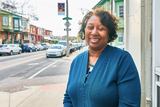

When Sesame Street, the lauded children’s television show, sought experts to help raise awareness of the increasing number of children experiencing homelessness, it turned to an equally lauded source: the Homeless Health Initiative (HHI) at Children’s Hospital of Philadelphia (CHOP).
Last fall, Sesame Street reintroduced a Muppet named Lily — who debuted in 2011 when her family was struggling with hunger — as part of a wider effort to shine a spotlight on homelessness. Lily explained that her family was sharing someone else’s home and experiencing homelessness. It’s a story all too common for 2.5 million children across America.
“When Sesame Street saw what we did, they thought, ‘Wow, the health perspective — we need to include that,’” says HHI Program Leader Karen Hudson, PhD, MSW, LSW.
Sesame Street in Communities, which creates online professional development videos, came to Philadelphia and filmed at one of the three homeless shelters where HHI provides check-ups and fitness activities for children and healthcare information and wellness sessions for parents. It filmed a women’s wellness group, led by HHI social work trainer Melissa Johnson, MSW, as a backdrop to profiling the program. HHI has expanded its services with the help of philanthropists like Joel and Stephanie Markel, who have generously supported CHOP’s homeless health initiatives since the 1990s in memory of their son, Ryan.
The film crew also went to the Nicholas and Athena Karabots Pediatric Care Center, where pediatricians who volunteer with HHI offered strategies and information for healthcare providers about successful ways of interacting with children and families experiencing homelessness. “We want doctors to care for these families in a respectful, culturally competent manner,” Hudson says.
Respectful, caring strategies
Asking open-ended questions, such as “Where are you living now?” and following up with “Is that a single-family home, an apartment, a shelter or transitional housing?” gives families the opportunity to share their circumstances. It’s helpful for pediatricians to know a child’s living situation since advice may differ if a family can’t cook its own meals, for example, or control noise levels at bedtime.
In December, Hudson was a featured panelist in an online, live-streamed forum on children experiencing homelessness for Sesame Workshop, the educational arm of Sesame Street. “I’m proud of the work we do at HHI,” Hudson says. “If by sharing our model we can help bring healthcare to children experiencing homelessness in other cities, all the better.”
Watch the video that profiles HHI at chop.edu/hhi-provider-portrait.
Featured in this article
Specialties & Programs

When Sesame Street, the lauded children’s television show, sought experts to help raise awareness of the increasing number of children experiencing homelessness, it turned to an equally lauded source: the Homeless Health Initiative (HHI) at Children’s Hospital of Philadelphia (CHOP).
Last fall, Sesame Street reintroduced a Muppet named Lily — who debuted in 2011 when her family was struggling with hunger — as part of a wider effort to shine a spotlight on homelessness. Lily explained that her family was sharing someone else’s home and experiencing homelessness. It’s a story all too common for 2.5 million children across America.
“When Sesame Street saw what we did, they thought, ‘Wow, the health perspective — we need to include that,’” says HHI Program Leader Karen Hudson, PhD, MSW, LSW.
Sesame Street in Communities, which creates online professional development videos, came to Philadelphia and filmed at one of the three homeless shelters where HHI provides check-ups and fitness activities for children and healthcare information and wellness sessions for parents. It filmed a women’s wellness group, led by HHI social work trainer Melissa Johnson, MSW, as a backdrop to profiling the program. HHI has expanded its services with the help of philanthropists like Joel and Stephanie Markel, who have generously supported CHOP’s homeless health initiatives since the 1990s in memory of their son, Ryan.
The film crew also went to the Nicholas and Athena Karabots Pediatric Care Center, where pediatricians who volunteer with HHI offered strategies and information for healthcare providers about successful ways of interacting with children and families experiencing homelessness. “We want doctors to care for these families in a respectful, culturally competent manner,” Hudson says.
Respectful, caring strategies
Asking open-ended questions, such as “Where are you living now?” and following up with “Is that a single-family home, an apartment, a shelter or transitional housing?” gives families the opportunity to share their circumstances. It’s helpful for pediatricians to know a child’s living situation since advice may differ if a family can’t cook its own meals, for example, or control noise levels at bedtime.
In December, Hudson was a featured panelist in an online, live-streamed forum on children experiencing homelessness for Sesame Workshop, the educational arm of Sesame Street. “I’m proud of the work we do at HHI,” Hudson says. “If by sharing our model we can help bring healthcare to children experiencing homelessness in other cities, all the better.”
Watch the video that profiles HHI at chop.edu/hhi-provider-portrait.
Contact us
Homeless Health Initiative